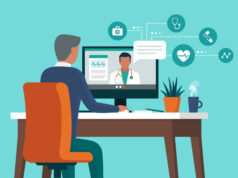
American healthcare has so many advantages: cutting-edge vaccine development, global experts in public health, massive gains in our technology and interoperability, while at the same time, Americans are suffering and dying because of a crisis of trust. The devastating health outcomes of distrust and a broken health contract this year have been made even clearer through this pandemic. The disproportionate impact of Covid-19 on communities of color and low-income and working people highlights that those who (often validly) have distrust of our healthcare systems are once again being harmed. And the cycle continues.
As Dr. Anthony Fauci told CBS News: “Clearly, we have not succeeded in getting the public as a whole uniformly to respond in a way that is a sound scientific [response to a] public health and medical situation. I mean, it is clear because right now, you’re seeing people throughout the country [contracting the virus]. And it’s unfortunate. And it’s frustrating.” That frustration has been a wake-up call to many health stakeholders, providers, and plans that have seen so starkly that our healthcare system isn’t working well for a huge percentage of the people who call this country home. Even the most reluctant leaders can see that we have to do better. The hurdles to health justice are significant, however, and trust is at the center.
If you asked people if they would take a Covid vaccine this fall, half of African Americans said no, and 65 percent voiced concerns that the development of a coronavirus vaccine isn’t taking the needs of Black people into account. More than a third of Latinos said no. African Americans and Latinos have been hit the hardest disproportionately by Covid, but they don’t trust the health system and other institutions for valid reasons. If there was ever a time for healthcare leaders to say we need to do a better job of understanding who our patients are, this is it — because understanding is a key step in building trust, and trust is the real healthcare work of the year ahead.
To produce better healthcare outcomes, there needs to be a much better understanding of who people are and what they need — using accurate and comprehensive health data shared by all providers. There is no longer such a thing as a one-size-fits-all approach to health communication and trust-building. There is no longer room for an inside-the-silo hoarding of health data. This is the moment for complexity, for knowing more, and for thinking about patients as unique humans. It is possible to earn trust. This is our greatest health challenge, especially in the year ahead. And in order to understand, the information has to be accessible.
Many states, including California, have made gains on health data exchange to facilitate this work. In our state, more than half of residents are served by the largest nonprofit exchange, providing key information such as address, language-preference, race, gender, medications, lab values, and medical history to providers. We need it desperately as the most linguistically diverse state in the country. An estimated 220 languages are spoken in California, and nearly half of our population speaks something other than English at home. San Diego County is one of the largest Arabic populations outside of the Middle East, speaking Farsi and Chaldean. Empowered with a little data, health leaders can take that critical first step of at least speaking the right language to the right person in healthcare communications.
Language is just the start, though. Culture runs much deeper. How does a person make decisions, where do they come from, where do they live now, what’s their experience with healthcare? What are the social determinants that help make it easier or harder for them to access healthcare? What are the myths they believe about healthcare? A lot of times the myths are the things that get in the way the most — the biases that we all have, the hopes or fears or dreams. It all comes into play when asking someone to come in for a well-child visit, or a diabetes screening, or to trust the fastest-ever-developed new Covid vaccines.
Healthcare should be able to treat people like who they are matters to us. Because it matters to them. Eleanor Roosevelt said, “It is not fair to ask of others what you are not willing to do yourself.” People want information in their own language. They want help getting to their doctor’s appointment. They want their primary care doctor to know that they were in the hospital last weekend. They want to skip filling out their medication history for the tenth time this month. They want a contact tracer to have their medical records on hand already. They want healthcare leaders to make an effort to make healthcare even just a little easier. Sharing health data is the first step. When healthcare leaders trust each other enough to share essential information on their patients — either through their own decisions or through forced policy change — real progress can be made on building patient trust and, as a result, real progress on better health.
Photo: zhaojiankang, Getty Images








